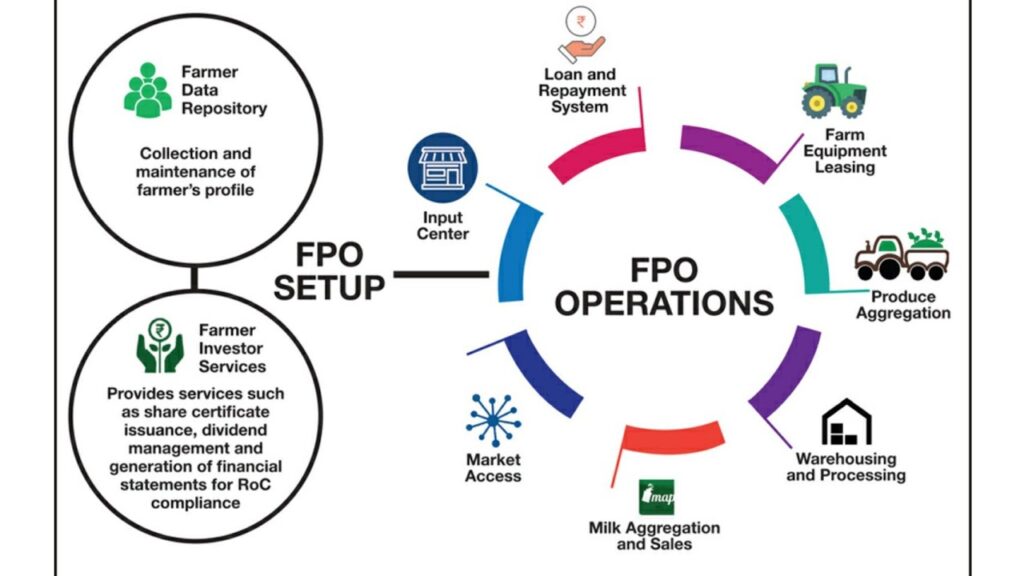Agents of prosperity
Farmer Producers’ Organisations have become engines of agri-innovation in UP
Relevance
- GS Paper 3 Major crops-cropping patterns in various parts of the country, – different types of irrigation and irrigation systems storage, transport and marketing of agricultural produce and issues and related constraints; e-technology in the aid of farmers.
- Tags: #fpo #farmer #agriculture #innovation #currentaffairs #upsc.
Why in the News?
The government’s strategy to enhance farmers’ income in Uttar Pradesh (UP) encompasses various approaches, including increasing productivity, reducing costs, improving marketability, crop diversification, risk mitigation, and adopting climate-resilient technologies. One significant challenge in this sector is fragmented landholdings, hindering economies of scale and discouraging agricultural investments.
Empowering Farmer Producers’ Organisations (FPOs)
- Farmer Producers’ Organisations, known as FPOs, have emerged as a powerful solution to address the issue of fragmented landholdings.
- These collectives are formed by farmers in geographical clusters and can be registered under the Companies Act or as cooperatives under the Societies Registration Act.
- FPOs play a crucial role in cluster-based farming, enabling economies of scale, agri-extension services, technology adoption, quality assurance, and helping farmers in marketing their produce.
Collaboration and Support
- To promote collaboration among farmers and enhance their capacities, the government of UP has established a dedicated FPO cell.
- The aim is to ensure scheme convergence, address compliance issues, and provide continuous support to FPOs to make them agents of prosperity in the rural economy.
- Additionally, the UP government has its own scheme to create FPOs, and a synergistic approach between central and state-sponsored schemes aims to establish an FPO in each of the 826 blocks in UP annually for five years, starting in 2022-23.
FPO Shakti Portal
- The FPO Shakti portal has been launched to provide a platform for active FPOs in UP, offering solutions for grievance redressal, forging business partnerships, and promoting convergence.
- As of July 15, close to 1,600 FPOs with a total turnover of Rs 229 crore have registered on the portal, benefiting over six lakh farmers.
Incentives and Infrastructure Development
- The Agriculture Infrastructure Fund provides a 3% interest subvention for credit extended to develop post-harvest infrastructure, a benefit available to FPOs.
- Additionally, the UP government offers an extra 3% subvention to FPOs and agriculture entrepreneurs, effectively reducing the overall interest on such loans to around 3%. These incentives encourage FPOs to develop post-harvest facilities like warehouses, cold storage, cold chains, and ripening chambers.
Convergence of Schemes
- The government is fostering the convergence of various schemes related to farm mechanization, seed production, agri-marketing, MSP-based procurement, nutrition missions, and technological interventions, such as agri-drones and organic farming.
Success Stories
- FPOs in UP are playing a pivotal role in crop diversification and value addition. They are involved in various agricultural sectors, from cereals to horticulture, pulses, oilseeds, millets, medicinal and aromatic crops, and sugarcane-based products.
- Many FPOs have established seed processing units, sell seeds in the open market, or collaborate with seed corporations for buy-back arrangements. These collectives also operate Farm Machinery Banks, offering farm mechanization services at reasonable rents and contributing to managing agricultural residues.
Innovations and Collaborations
- FPOs are engines for innovation and have been pivotal in various government initiatives. They play a crucial role in improving nutrition by developing value chains for high-nutrient agri-products and collaborating with district administrations on nutrition programs.
Fostering Partnerships
- More than 200 MoUs have been signed between FPOs and companies in areas of commodity marketing, input supply, technical dealership, and financial linkage. The government is actively facilitating these collaborations.
Geographical Indications (GI)
- FPOs have successfully registered local products under GI, contributing to the recognition and preservation of unique products in UP.
Farmer Producers’ Organisations in UP have become instrumental in promoting agriculture, innovation, and economic prosperity. Their role in addressing the challenges of fragmented landholdings and fostering collaboration is pivotal in the government’s vision of enhancing farmers’ income and agricultural sustainability.
|
What are FPOs
Challenges
Benefits
Government Schemes
|
Sources: Indian Express
Mains Question
“Examine the role of Farmer Producers’ Organizations (FPOs) in promoting agricultural innovation, economic prosperity, and addressing the challenges of fragmented landholdings in the context of Uttar Pradesh. Discuss the various government initiatives, incentives, and collaborative efforts that have contributed to the success of FPOs in UP.




